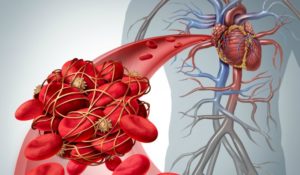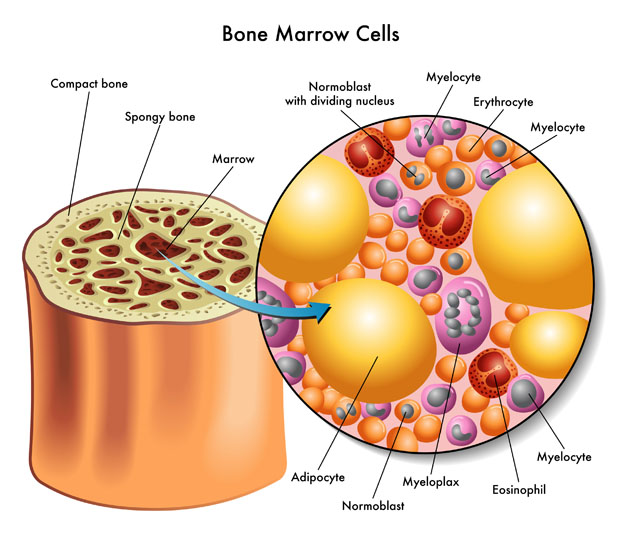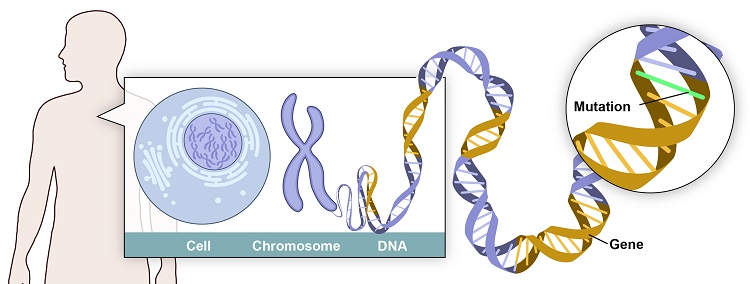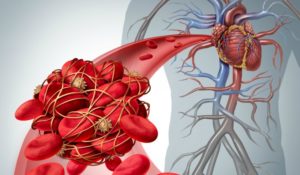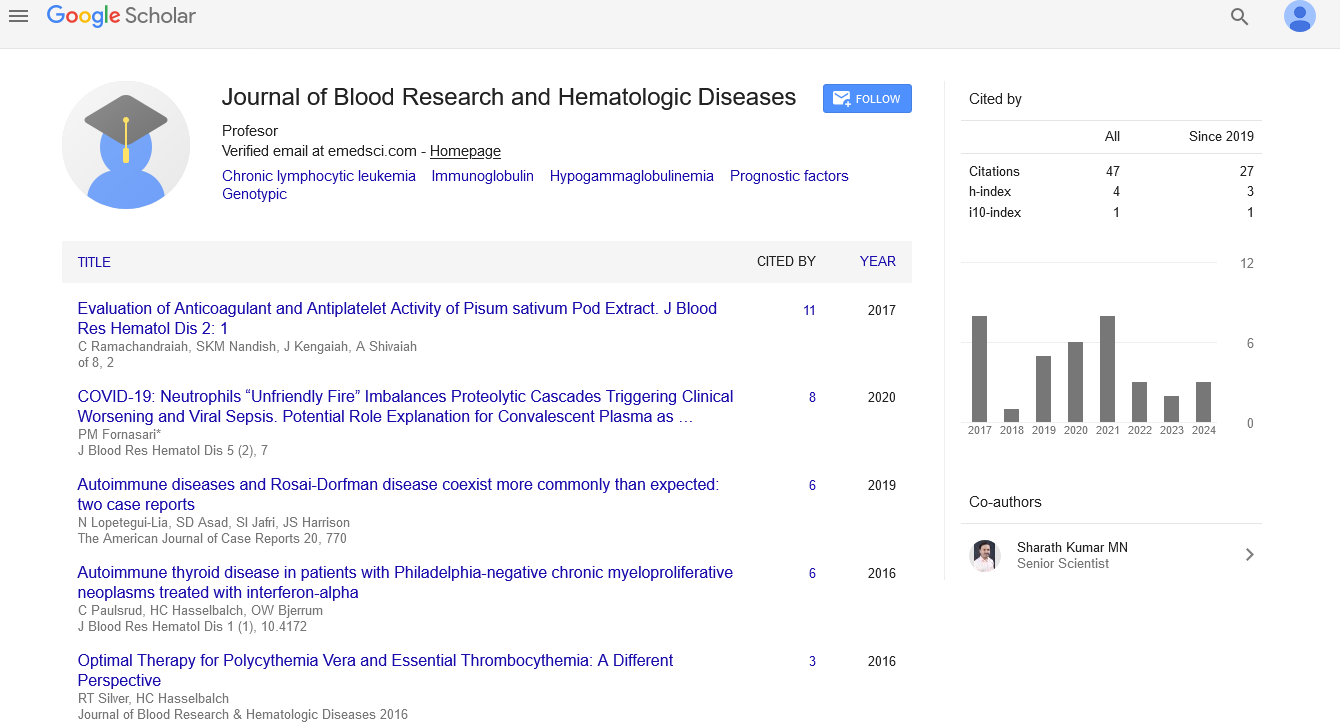About the Journal of Blood Research & Hematologic Diseases
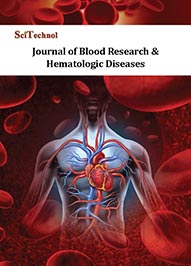
Journal of Blood Research & Hematologic Diseases is a peer-reviewed scholarly journal that aims to publish the most complete and reliable source of information on the discoveries and current developments in the mode of original articles, review articles, case reports, short communications, etc. in all areas of blood-based medicine including basic and clinical sciences for blood and blood diseases.
Journal of Blood Research & Hematologic Diseases focuses on the topics include:
- Hematology
- Blood cells
- Genetics of Blood Cells
- Blood Physiology
- Blood Disorders & Diseases
- Etiology of Blood
- Pathophysiology of Blood Disorders
- Blood Malignancies
- Blood-based Therapeutics or Hemotherapy
- Transfusion Medicine
- Immunohematology
- Transplantation Studies
Review processing is performed by the Editorial Board members of Journal of Blood Research & Hematologic Diseases or outside experts; at least two independent reviewers approval followed by editor approval is required for acceptance of any citable manuscript. Authors may submit manuscripts and track their progress through the system, hopefully to publication. Reviewers can download manuscripts and submit their opinions to the editor. Editors can manage the whole submission/review/revise/publish process.
Manuscript can be submitted via Online Submission System or sent as an e-mail attachment to the Editorial Office at manuscripts@scitechnol.com
Blood
Blood is the red bodily fluid that circulates in human body providing the body its necessary substances such as nutrition, oxygen to and metabolic waste removal from cells. Blood is circulated through blood vessels, pumped by the heart and acts as the body’s transport system.
Blood Cells
Blood, a highly specialized tissue, is composed of Blood cells (Haemocyte), produced by hematopoiesis, suspended in Blood plasma. Blood cells are made in Bone Marrow and are categorized into: Red blood cells, White blood cells and Platelets. These together add up to a total 45% of the blood tissue by volume and the remaining 55% is composed of Plasma.
Hematology
Hematology is a branch of medicine pertaining to the study of blood, blood diseases/disorders related blood and treatment and prevention of the diseases that affect the production of Blood and its components. On whole, Hematology study, diagnosis and overall management of Blood disorders.
Hemoglobin
Hemoglobin is a complex protein present in red blood cells containing an Iron molecule. It is an oxygen transport metalloprotein that carries oxygen from lungs to the body tissues, and maintains the shape of the red blood cells. Normal Hemoglobin contains four protein molecules: two α-globulin chains and two β-globulin chains.
Circulatory System
Circulatory System or Cardiovascular System is an organ system with a network of vessels and organs that permits blood to flow and circulate to transport necessary body substances to and from the cells. Heart, Blood and The Blood Vessels are the parts of the Circulatory System. Hemodynamics is the study of the blood circulation or flow and Hemorheology refers to the study of the flow properties of blood.
Transfusion medicine
Transfusion Medicine is a branch of medicine that deals with the transfusion of blood and its components. The study concerns about the process of transfusion chain. The study of transfusion medicine includes: Processing of Blood products, Imunohematology, Stem cell research, Cell therapy, Apheresis.
Hemostasis
Hemostasis is the arrest or the stoppage of bleeding, the Cloth formation. It is the process of arresting the blood flow from an injured blood vessel or organ of the body which requires the combined activity of vascular, platelet, and plasma factors. Any Hemostatic abnormalities lead to thrombosis (excessive bleeding).
Hematopoiesis
Hematopoiesis or Hemopoiesis is the process of formation of Blood Cell Components. It is a process of blood cell production and maturation in the bone marrow. All types of blood cells are derived from pluripotent stem cells.
Thrombosis
The process of formation of a blood clot, known as thrombus, in a blood vessel which obstructs or block the blood flow from an injured blood vessel or organ of the body is called Thrombosis. The movement of clots to the crucial parts of the circulatory system may cause serious complications.
Blood Disorders
Blood is a multifaceted body fluid that acts as the medium to deliver the essential nutrients to tissues throughout the body. Any disturbance or disorders that prevent the blood to function properly may affects total health. Blood disorders affect one or more parts of the blood, which can be acute or chronic. Most common blood disorders include: Anemia, Bleeding Disorders and Blood Cancers.
Bleeding Disorders
Bleeding Disorders are the group of medical conditions involving poor blood clotting or abnormal bleeding. Here the ability of the blood to clot is impaired leading to prolonged bleeding after the injury or surgery or spontaneous bleeding without known cause. The disorders can be inherited, acquired or side effects of certain drugs.
Blood Cancers
Blood Cancers are a group of diseases that affects the production and function of blood cells, bone marrow and lymphatic system. These are characterized by unregulated cell proliferation of abnormal blood cells produced in the bone marrow that interrupts the functioning of Blood. There are three main groups of blood cancer: Leukaemia, Lymphoma and Myeloma.
Blood Vessels
Blood vessels are the hollow tubes formed as intricate networks found throughout the body in which blood circulates or transport blood throughout the entire body. There are three types of blood vessels: arteries (carry oxygenated blood from the heart to all parts of body), veins (carry oxygen-depleted blood towards the heart), and capillaries (connect the arteries to veins).
Anemia
Anemia is a condition in which there is a deficiency of red cells or of haemoglobin in the blood. The body does not produce enough healthy red blood cells to carry adequate oxygen to your tissues. Anemia is caused by blood loss, decreased red blood cells or by the destruction of red blood cells.
Leukaemia
Leukaemia is cancer of blood-forming cells, a malignant progressive disease that affects the white blood cells that are produced by the bone marrow. Leukaemia affects the bone marrow and causes too many abnormal white blood cells to be produced impairing the normal functions of Leucocytes. Leukaemias are of two types: Myeloid and Lymphocytic Leukaemias.
Stem Cell Transplant
Stem cell transplant or Bone Marrow Transplant is a medical procedure where the diseased bone marrow is replaced by infusing healthy and specialized that develop into healthy bone marrow. Hematopoietic stem cells (HSCs) are the stem cells found in bone marrow that give rise to the formation of Blood Cell Components through the process called Hematopoiesis. Stem cell transplantation is an effective treatment for a wide range of diseases like cancers, severe blood diseases and certain immune-deficiency diseases.
Lymphoma
Lymphoma is a form of cancer that affectsa part of the immune system, lymphatic system. Lymphoma is a group of blood cancers of immune cells called lymphocytes that develop in the lymphatic system. There are two broad types of Lymphoma: Hodgkin lymphoma and non-Hodgkin lymphoma (NHL).
Myeloma
Myeloma or Multiple myeloma, is a cancer arising from a type of white blood cell called plasma cell, (made in the bone marrow) which are responsible for producing antibodies which are critical for maintaining the body’s immune system. Multiple myeloma leads to the production of abnormal proteins- M proteins which impairs the function of Plasma cells and may damage kidneys, cause tumors, kidneys, and impair immune system function. Multiple myeloma is the second most common blood cancer.
Blood Coagulation
Blood Coagulation or Clotting is a process by which a blood clot is formed to block or prevents bleeding. It is the process by which blood changes from a liquid to a gel. Coagulation involves two components: cell (platelet) enmeshed in a network of insoluble fibrin molecules and protein (coagulation factor).
Fast Editorial Execution and Review Process (FEE-Review Process):
Journal of Blood Research & Hematologic Diseases is participating in the Fast Editorial Execution and Review Process (FEE-Review Process) with an additional prepayment of $99 apart from the regular article processing fee. Fast Editorial Execution and Review Process is a special service for the article that enables it to get a faster response in the pre-review stage from the handling editor as well as a review from the reviewer. An author can get a faster response of pre-review maximum in 3 days since submission, and a review process by the reviewer maximum in 5 days, followed by revision/publication in 2 days. If the article gets notified for revision by the handling editor, then it will take another 5 days for external review by the previous reviewer or alternative reviewer.
Acceptance of manuscripts is driven entirely by handling editorial team considerations and independent peer-review, ensuring the highest standards are maintained no matter the route to regular peer-reviewed publication or a fast editorial review process. The handling editor and the article contributor are responsible for adhering to scientific standards. The article FEE-Review process of $99 will not be refunded even if the article is rejected or withdrawn for publication.
The corresponding author or institution/organization is responsible for making the manuscript FEE-Review Process payment. The additional FEE-Review Process payment covers the fast review processing and quick editorial decisions, and regular article publication covers the preparation in various formats for online publication, securing full-text inclusion in a number of permanent archives like HTML, XML, and PDF, and feeding to different indexing agencies.
 Spanish
Spanish  Chinese
Chinese  Russian
Russian  German
German  French
French  Japanese
Japanese  Portuguese
Portuguese  Hindi
Hindi 
